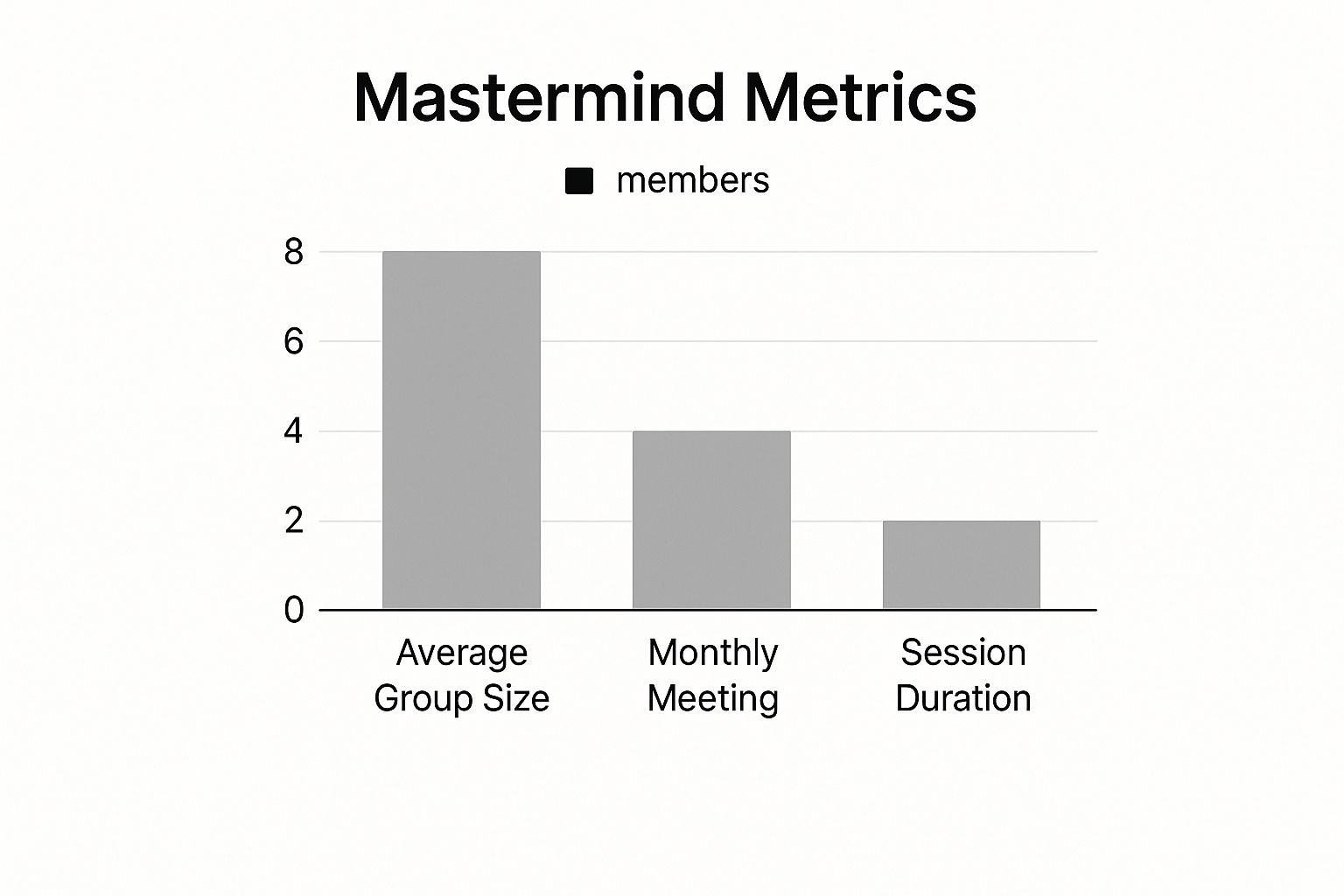Stay Updated with Everything about MDS
Thank you! Your submission has been received!
Oops! Something went wrong while submitting the form.

Chilat Doina
September 19, 2025
Ever feel like you're running your business on an island, trying to navigate every critical decision alone? A business mastermind group is your answer. Think of it as your personal board of directors, a dedicated circle of peers providing accountability, collective wisdom, and unbiased support. It’s a genuine alliance built on mutual success, not just another stuffy networking event.

Picture this: you're facing a make-or-break challenge. Maybe your inventory is piling up, or a key marketing channel just collapsed overnight. You're shouldering the weight of every single decision. This kind of isolation is a brutal, all-too-common reality for entrepreneurs, but it absolutely doesn’t have to be yours.
This is exactly where business mastermind groups come in.
These are structured, confidential forums where founders and business leaders meet regularly to hash out challenges and uncover new opportunities. Forget what you know about typical meetings; this is more like a strategic huddle with your most trusted advisors—people who get the pressure because they live it, too.
A mastermind is worlds away from a casual meetup. It's built on a foundation of deep trust and unwavering commitment. The real magic flows from the shared, lived-in experiences of everyone at the table. This structure gives you some serious advantages:
A true mastermind is an environment of total trust and zero judgment. It’s a space where your biggest professional hurdles are met with collective intelligence and genuine support, transforming the lonely journey of entrepreneurship into a collaborative pursuit of excellence.
Of course, beyond peer-to-peer insights, some leaders also seek out more formal support through dedicated leadership development programs. But the power of a peer-driven model is undeniable.
For e-commerce leaders, joining a curated community like the MDS Founders Club can offer this exact blend of peer support and expert guidance, putting both business and personal development on the fast track. This guide will walk you through how to find—or even build—the right group for you.

So, what’s all the buzz about? At its heart, a business mastermind group runs on a simple but incredibly powerful idea, one famously championed by Napoleon Hill almost a hundred years ago.
The concept is this: when a small group of ambitious people get together with a shared purpose and a spirit of true collaboration, they create a sort of “third mind.” This collective intelligence is far smarter and more insightful than any single person in the room.
Think of it like a championship sports team. You have a roster of individual stars, but the magic happens when they play together. They share a strategy, trust each other’s moves, and anticipate what’s next. One player’s skill makes another better, creating a powerhouse that’s way more formidable than just a collection of talented individuals. That’s exactly the dynamic a great mastermind brings to business challenges.
This whole idea was brought to the forefront by Napoleon Hill in his classic book, Think and Grow Rich. He saw the mastermind as a kind of peer-to-peer mentoring circle, where everyone works together to solve problems and hit their goals faster. When he studied industrial giants like Henry Ford and Andrew Carnegie, he found that their incredible success was almost always backed by a tight-knit inner circle—their own informal mastermind group.
Let's be clear. A real mastermind is a confidential peer advisory board that is absolutely obsessed with growth. It's a structured, intentional space where you're both a student and a teacher in every single meeting.
The whole point is to tap into the group's collective brainpower, experience, and network to help every member blast through obstacles and jump on opportunities way faster than they ever could on their own.
This laser-focus is what makes it completely different from other professional get-togethers. A mastermind is not:
The core belief of any successful mastermind is that no one of us is as smart as all of us. It’s a pact to pool your intellectual and emotional resources to build shared momentum and find solutions that are invisible when you're going it alone.
To get to that level of collective genius, the best groups use powerful team creativity exercises to spark new ideas and break down tough challenges. These structured activities make sure every perspective is heard and every possible solution gets a fair shot.
For the mastermind concept to actually work its magic, a few things are non-negotiable. Without them, you’ve just got another meeting on the calendar.
First is unwavering commitment. Members have to show up—not just physically, but mentally. That means prioritizing the meetings and coming prepared to give your full attention and energy.
Second is absolute trust. This is what allows for the vulnerability needed to talk openly about your biggest fears, failures, and challenges. Without it, the conversations stay shallow.
Finally, strict confidentiality is the bedrock that makes that trust possible. What’s said in the group stays in the group. Period. These pillars create the psychological safety net needed for the kind of radical candor and deep collaboration that leads to real breakthroughs.

Okay, let's get past the theory. The real magic of a mastermind group isn't in the concept; it's in the results you see in your business and your own leadership. It’s not just about sharing ideas. It's about genuine progress, usually built on four pillars that can completely change the game for you.
Imagine you’re stuck on a complex logistics problem that’s about to cost you thousands. On your own, you're looking at a stressful week of late-night research and a decision that feels like a total crapshoot.
Now, picture this: you bring that exact problem to your mastermind. Instantly, you have access to decades of combined, real-world experience from seven other founders in the room. Someone has almost certainly been there, done that. They’ll give you the name of the vendor who saved their bacon, the script to use, or the tiny operational tweak you overlooked. This isn't just advice; it's a shortcut that saves you a massive amount of time, money, and headaches by letting you learn from someone else's expensive lessons.
Let’s be honest. Your employees will tell you what they think you want to hear. Your family and friends will offer support, but they aren't equipped to give you a strategic critique.
Your mastermind peers are different. They have no agenda other than to see you succeed, which means they aren't afraid to deliver the hard truths you need to grow. When you commit to a big goal in front of them, you're not just saying it out loud—you're making a promise to people you respect. That creates a powerful, motivating layer of accountability you just can't find anywhere else.
The accountability in a mastermind isn't about pressure; it's about mutual respect. Your peers hold you to a higher standard because they genuinely believe in your potential and refuse to let you settle for less.
Most networking events end with a pocketful of business cards and a handful of shallow conversations. A mastermind is the complete opposite. It's an environment intentionally designed for building deep, trust-based relationships over months, or even years, of shared struggles and wins.
These people don't just become contacts; they become your go-to collaborators. They're your first call when you need a critical introduction, your partners for a potential joint venture, and your trusted allies. The value here isn't in the number of connections, but in the unshakeable quality of a trusted inner circle.
Every founder has those "crazy" ideas or nagging fears that are too raw or sensitive to share with their team, investors, or even their spouse. A mastermind acts as a confidential vault where you can safely explore your biggest ambitions and confess your toughest challenges without an ounce of judgment.
Think of it as your strategic safe harbor. It’s a place where you can:
This level of psychological safety is what allows for the bold thinking and emotional resilience you need to survive the rollercoaster of building a business.
Not all business mastermind groups are created equal. Far from it. Choosing the right one is like picking the right workout plan—what works for a powerlifter isn’t going to help a marathon runner. Your goals, your budget, your personality, and where you are in your business journey all play a huge role in finding a group that delivers real value.
Think of it this way: a free, peer-led group is kind of like a casual running club. It’s fantastic for accountability and camaraderie, but the structure is loose, and the expertise in the room is limited to whoever shows up that day.
On the flip side, a paid, professionally facilitated program is like hiring a personal trainer. You get expert guidance, a structured plan, and a much higher level of commitment, but it comes with a premium price tag. Neither is inherently "better"—they just serve different needs.
To make an informed choice, you really need to understand the landscape of options out there.
The biggest differences between formats usually boil down to cost, structure, and the level of professional oversight. A founder just starting out might get immense value from a scrappy, peer-driven circle. But a CEO scaling an eight-figure brand will likely need the curated experience of a high-ticket, facilitated group to solve their next-level problems.
To help you figure out the best path forward, here’s a breakdown of the most common formats you’ll come across.
This table breaks down the key characteristics, costs, and benefits of different mastermind group models to help you choose the right one for your goals.
Each model offers something a little different, so it's all about matching the format to your current challenges and what you're hoping to achieve.

The numbers here give you a good idea of a common structure: smaller groups meeting more frequently for focused sessions. This ensures everyone gets dedicated time in the hot seat.
The most important question to ask isn't "What's the best mastermind group?" but rather, "What's the best mastermind group for me, right now?"
Your ideal format will almost certainly change as your business grows and your challenges evolve. What you need today as a solo founder is very different from what you'll need as the leader of a 50-person team.
Ultimately, choosing a mastermind format is about aligning your investment—of both time and money—with your most pressing business needs. By understanding these key differences, you can confidently pick a group that will act as a true catalyst for your growth instead of just another meeting on your calendar.
So, you're sold on the idea of a mastermind group. That's the easy part. The real challenge? Finding the right one. The perfect group isn’t just going to fall into your lap; you need a solid game plan for tracking one down and a sharp eye for vetting them to make sure your investment of time and energy actually pays off.
The best place to start is usually right under your nose: your existing network. LinkedIn is an obvious first stop, but don't sleep on niche industry communities on platforms like Slack or dedicated forums. More often than not, the best leads come from trusted peers who are already part of a high-value group.
Your search needs to be deliberate. Instead of a generic Google search for "business mastermind groups," get specific. Zero in on circles that align with your industry, business stage, or the exact challenges you're facing right now.
Here are a few prime channels to start exploring:
Once you’ve got a promising group on your radar, it's time to do some digging. A thorough vetting process is what protects you from joining a group that’s a total dud. Treat it like an interview—you’re sizing them up just as much as they're sizing you up.
Before you even think about committing, make sure you get clear answers to these questions from the facilitator or a current member:
A great mastermind is an investment in your growth, not just another line item on your budget. The real value is in the structure, the quality of the people in the room, and the tangible results they help you generate.
Modern masterminds have evolved into serious economic engines. Take Business Network International (BNI), for example. It's grown into a global powerhouse with over 333,000 members who generated $25.3 billion in deals last year. The high-end programs can cost thousands per month, which just goes to show the immense value founders place on curated peer intelligence and strategic networking. GrowthMentor.com has a great piece on how these groups drive growth if you want to dive deeper.
Sometimes, the perfect mastermind group for you simply doesn't exist. That's when you have to build it yourself.
Creating a group from scratch puts you in the driver's seat, letting you build a high-impact alliance designed around a very specific set of goals. This isn’t just about putting a few meetings on the calendar; it’s about architecting a support system that actually works.
The first step? Define a crystal-clear mission. What’s the ultimate point of this group? Is it for e-commerce founders pushing to break the eight-figure mark? Or maybe it's for SaaS entrepreneurs trying to navigate their first big product launch. A laser-sharp focus is what attracts the right people and keeps every single conversation relevant.
Once your mission is set, you can start sketching out your ideal member profile. Think about the stage of business, the industry, and even the mindset you're looking for. The goal isn't to create an echo chamber, but to make sure there's enough shared experience in the room so members can offer genuinely valuable, context-aware advice.
Now that you know who you’re looking for, it’s time to start recruiting. Begin with your most trusted network—these first few members will set the tone for everything that follows. Look for people who aren't just successful, but who are also collaborative, committed, and willing to be vulnerable.
Sourcing members for a new mastermind is one of the most valuable things you can do. Our guide on building an e-commerce community has some extra tips on how to gather like-minded entrepreneurs.
Before you send out any formal invites, have a quick, informal chat with potential members to see if they're interested and if the mission clicks with them. Make sure they get the level of commitment required. A small group of highly engaged members is way more powerful than a big group of people who are only halfway in.
With your founding members on board, it’s time to build the group’s operating system together. This is where you lay down the non-negotiables that will make the group both effective and a safe space for everyone.
Your ground rules should cover a few key things:
The most successful masterminds in history all ran on a foundation of shared goals and deep trust. From the Carnegie Mastermind Alliance that helped build a steel empire to the Homebrew Computer Club that kickstarted the PC revolution, these groups thrived because every member was all-in on the collective's success. You can find more lessons from these famous masterminds throughout history.
Finally, get your first few meetings on the calendar and run them with a clear agenda to build momentum. Those initial sessions are absolutely critical for fostering a culture of trust and radical candor—they set the stage for all the powerful breakthroughs to come.
Even after seeing all the upsides, you probably still have a few questions floating around. That’s totally normal. Let's dig into some of the most common things founders ask about business masterminds to clear up any confusion before you jump in.
Getting these answers straight helps you set the right expectations for what you’ll give and what you’ll get.
The sweet spot is usually somewhere between 6 to 10 members. This range is small enough that everyone gets a real chance to speak and get feedback during each meeting. At the same time, it’s large enough to bring a solid mix of different viewpoints and experiences to the table.
Go too small, and you risk the conversation getting stale. But if the group gets too big, it’s almost impossible for everyone to get the focused attention they need for their specific problems, and it's much harder to build those deep, meaningful connections.
The time commitment can vary, but a pretty standard setup is one 2-4 hour meeting each month. The meeting itself, though, is just one piece of the puzzle.
You also need to factor in the time to prep before each session and—this is the important part—the time you'll spend actually doing the things you committed to. Some of the more intense, paid groups might even throw in quarterly retreats or more frequent check-ins.
Before you sign up for any mastermind, get crystal clear on the total time expected. Making sure it actually fits into your schedule is the only way you'll get real value and be able to pull your weight for the rest of the group.
Not at all. While you'll definitely find some exclusive, high-ticket groups for seasoned CEOs, there are masterminds out there for literally every stage of the entrepreneurial game. You can find fantastic, high-value groups focused on:
What matters most isn't your job title. It's about finding a room full of people who are wrestling with similar challenges or are at a comparable point in their business journey. That’s what makes the advice sharp, relevant, and something you can use the very next day.
At Million Dollar Sellers, our members are top-tier e-commerce entrepreneurs who get the power of putting brilliant minds together. Our community is essentially a high-level mastermind, giving you the network and insights you need to scale smarter, not harder. Learn more about joining an elite circle of founders at milliondollarsellers.com.
Join the Ecom Entrepreneur Community for Vetted 7-9 Figure Ecommerce Founders
Learn MoreYou may also like:
Learn more about our special events!
Check Events